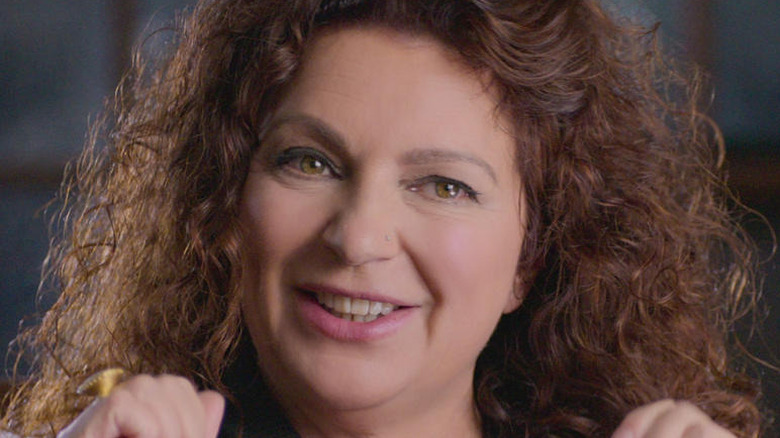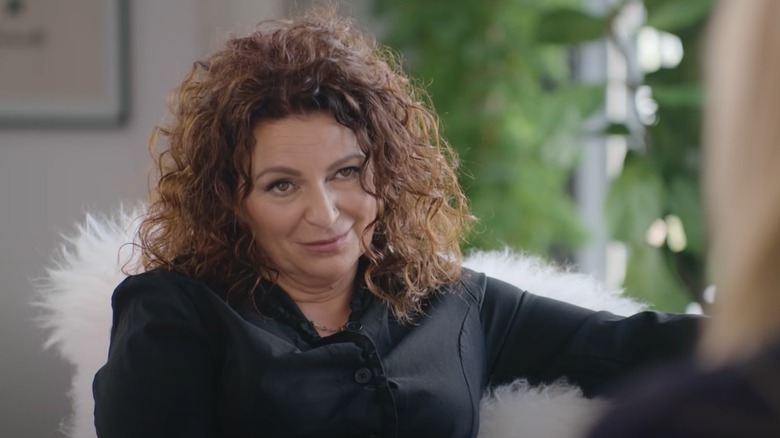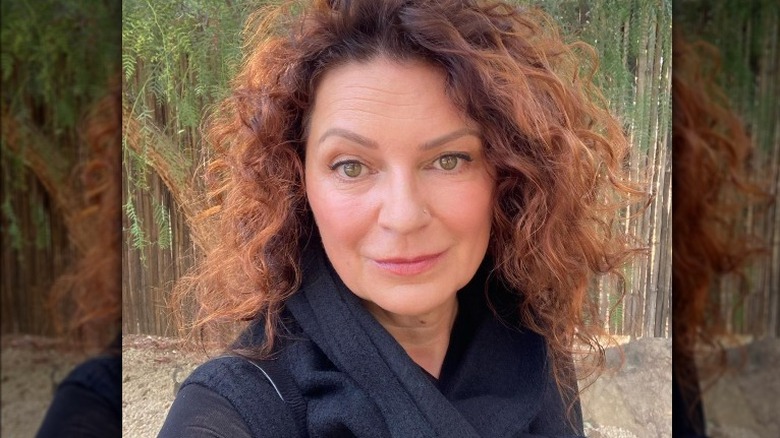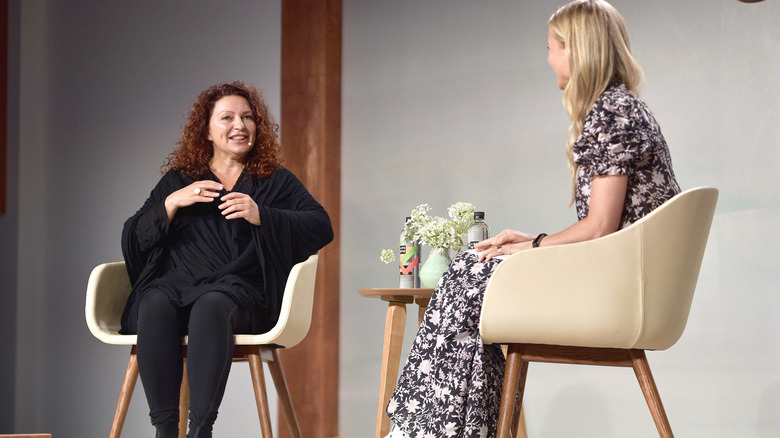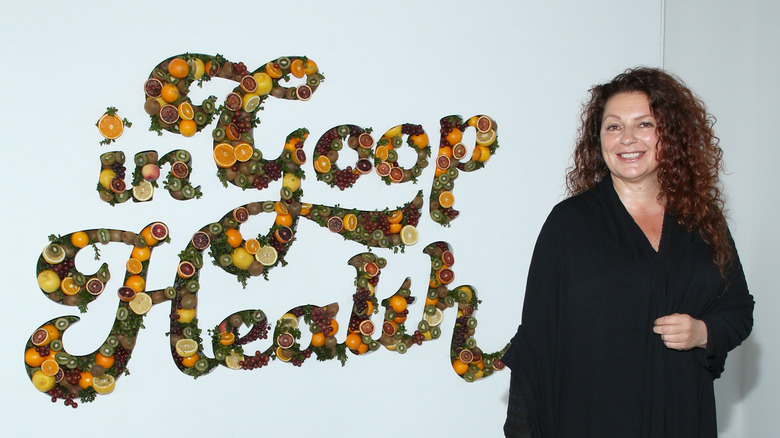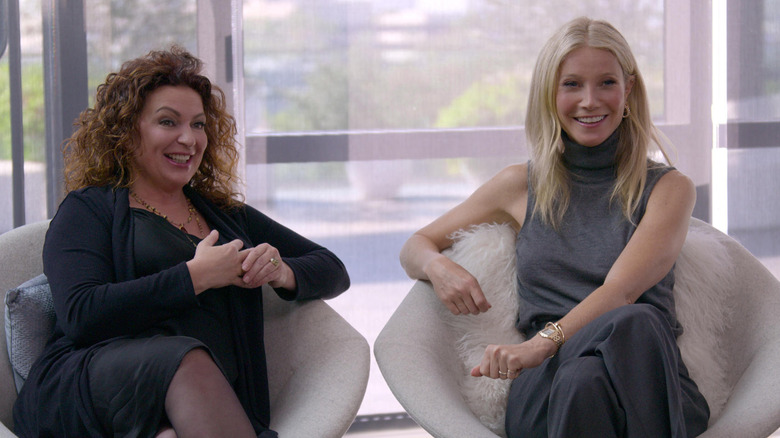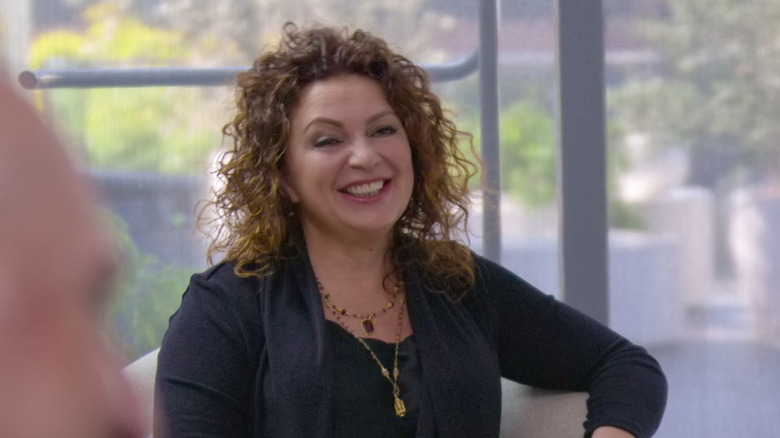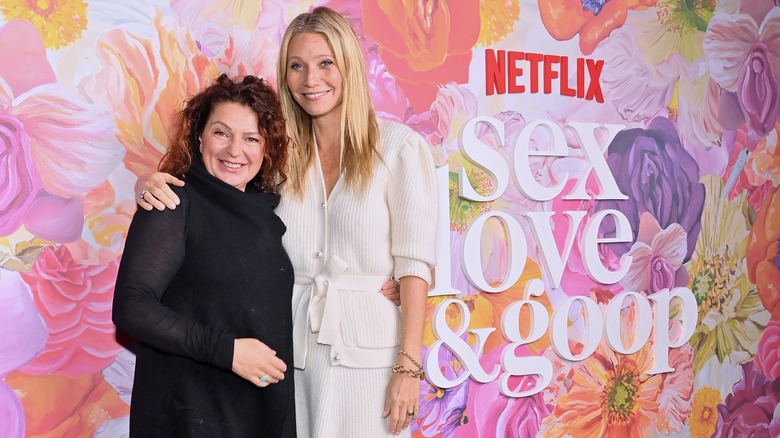Michaela Boehm Dishes On Sex, Love & Goop And Gwyneth Paltrow - Exclusive Interview
If there's one thing that Gwyneth Paltrow can brag about — and we're sure there's plenty for her to choose from — it's that she bravely confronts and leans into what some might typically consider to be taboo. Indeed, since the creation of her lifestyle brand, "goop," the actress has been a major player in helping facilitate fundamental conversations, from sexual health and masturbation to healthy relationships and feminism — and with the help of an impressive panel of experts, it seems there's nothing this team of badass and educated women can't handle.
If you were a fan of Paltrow's Netflix series "The goop Lab," you're going to love her brand new series, "Sex, Love & goop." The show follows five courageous couples who learn lessons about and methods for having more pleasurable sex and deeper intimacy, which in combination work to powerfully enhance their relationships. And while we love hearing from Paltrow on the show, for this series, she takes more of a backseat and lets her experts do the talking — which includes the prolific and wise Michaela Boehm.
The List had the chance to sit down with Boehm, an expert in intimacy and sexuality, to chat to her all about her unique career, experience on the show, and one-on-one moments working with Paltrow. And you're not going to want to miss out on the relationship advice she graciously shared with us.
Michaela Boehm thought she might be a doctor someday
I'd love to know a little bit about how you first became involved with your line of work?
Well, the very quick answer is that I wanted to become a doctor, so meaning I knew I wanted to be essentially helping and supporting people and I wasn't quite sure how it was going to go. And in Austria, healing and supporting people essentially means you become either a doctor or psychologist.
Right!
So I decided to essentially work with people's minds and I was very interested in embodiment at an early age. Even with 16, 17, 18, I was very much into somatics and how the body and the mind worked together and how to support growth in humans holistically. So that's how I entered into the world of what I'm doing now. And so I started with counseling and I've done an enormous amount over 30,000 one-on-one counseling hours in my career.
Gosh!
Yeah, it's a lot.
It's incredible.
I did a lot of miles because I used to see eight, nine people a day, five days a week.
Wow.
Fifty weeks a year for many years. And I have a very extensive clinical experience working with kind of dual diagnosis, trauma, rehab, personality disorder population. And so all that said, all of that experience in working with both trauma and with relationship and couples led me to develop the body of work I do now, which kind of combines a very trauma-informed somatic approach with a very, very practical relationship approach. Because often when people used to come to me, I had to intervene before the relationship dissolved and that took precedence over unpacking the entire family of origin. So that's why my approach is essentially very, very practical. And also over those 25-plus years that I've done that, I've kind of figured out what works versus what doesn't work and how to sequence things.
Boehm compares learning new relationship skills to learning a sport
Yeah. And you touched on this a little bit, but as far as you can remember, were you always interested in this notion of love and relationships and these interpersonal skills?
Yes. I've always been very, very interested in what makes people tick and how things essentially work when you are not only involved with your own stuff, but when another person comes into the mix and that's been a fascination of mine from very early on.
And so, when we're talking about these relationships, it's not necessary or is it necessarily love and romantic relationships or does it extend to even platonic relationships or friendships?
To me personally, they're all one skill set. So I don't, of course, when the romantic comes in and particularly when the sexual comes in, a relationship gains another dimension of complexity. But in general, the same principles that make any relationship in that romantic domain good and lasting and sustainable also apply to friendships, to family, to what parents ideally bring to their children, corporations I've worked with big companies on company culture and things like that. It follows the same principles that can be sliced different ways. Sex, of course, makes things much more interesting and much more complicated.
Absolutely. And so you said in the show that relationships and sex are like a specific skillset similar to playing golf, which I loved. How is that something that we can practice? I mean, how do we perfect these skills as if, as if it's a sport?
Well, I think I say this in the show as well, but it's really important to understand that, of course human beings are creatures of habit, of programming, right? That's how we learn everything, the way our brains and our nervous system are developed is by repetition. And so anything we want to learn in the realm of behavior and skill is learned through constant repetition, practice makes perfect. Right? And so of course, relationships, and particularly sex, are areas where you are somehow supposed to learn something that actually requires skill and repetition by being chaste and virginal, for instance.
Right.
Right? Which is quite nonsensical when you look at it as skill development. Nobody would expect you to be a virgin of golf and play the masters.
Yeah. Of course.
That just would never happen.
Right.
But of course, because there's moral and also practical issues that have to do with consent and agency and all of those things. We don't actually have a repetitive habit-forming skill development in sex. In relationships, you typically pick things up from the people who raise us, who don't always have the best relationships, of course.
How can one become proficient in relationships?
So it does seem in some ways that you practice it by kind of just stumbling through it a little bit at the beginning, which I guess is like when you pick up a golf club. Like you said, you're not going to be great at it at the beginning. But I feel like it's one of those things where you learn how to be in a good relationship once you've kind of experienced it and made some mistakes and experienced some things that help you later on. Would you agree with that?
Partly, yes. So I think similar to golf once again, right? Not much more complicated ... When you have certain imprints from, let's say, your upbringing, other relationships, like the one with your parents and things like that, you might already come in with bad habit patterns. So when you pick up a golf club by yourself and you just try, then you might develop some bad habits around your swing, for instance. This is also true with tennis or something, that get you only so far, and then you can't proceed because you are not actually correctly swinging or things like that. And the same is true with good relationships. On one end, I agree with you [about] that. How do we learn about what we want in relationships and what's good? We do it, we fail, we stumble, we adjust, and we get better. And we also get clearer on what kind of relationship we want and what skills we need to have good relationships. But if you have essentially bad form, meaning you have bad imprints, sometimes people talk about attachment styles and things like that as well.
Yeah. Right.
Then when then you are compromised in your ability to do the best in a relationship. And so it's good if you want to become a golf legend. You need to have a golf pro look at your swing and make sure that you are actually having a form that can be imprinted and that can be learned for success. Instead of habitually repeating things that become habits that are actually not good for you.
Don't fret if the spark is gone, advises Boehm
Right? Yeah. Well, thank you for explaining it like that. I think that makes a lot of sense. And what's something that you wish people understood more about your job and what you do?
Well, one of my big pet peeves at what I constantly have to work with, when people come see me — I teach a lot of workshops and public things — is that, people automatically assume that when the chemistry wanes, right, when the spark goes, the relationship is doomed.
Right?
And it's actually, and this is really a bit controversial to say, right? It is actually a sign of the relationship progressing positively. And that's very hard to understand for people because, and I have to qualify that by saying, this is not always the case. Sometimes a relationship degrades and goes away, right? But in a healthy, normal way that people develop, they get a certain kind of a closeness. And when they get that closeness and that commonality, that makes the relationship good, that's when the sexual attraction, hopefully, temporarily wanes.
Because sexual attraction is built on opposition, right? Opposites attract. [A] good long-term sustainable relationship is built on birds of a feather stick together, so to speak, right? So the more commonality, the more common values, interests, friends, ideas, location you have, the better your relationship will develop, including communication. But all the things that make your relationship deeper don't necessarily make the sex more exciting. Because the sex is exciting when you actually don't know that much about the person, you don't spend that much ... time with the person. So that all said, there's a natural progression where the normal, natural sexual chemistry wanes, the relationship deepens. And then the next step would be to actually deepen the sexual engagement.
Right.
And some people do that naturally and they can narrate it and say, "Wow, we used to essentially hang off the chandeliers, but now it's deep," right? Now we're intimate, now we're connected. But for some people, the moment the natural attraction wanes, they think something's horribly wrong and that the relationship is doomed. And then they do all kinds of stuff like cheating or porn or shopping or drinking or whatever, right? And so, or they get resentful and they start nagging and things like that.
Yeah.
So I think that's my biggest thing that I would like for people to know is that when the spark is gone, that is not necessarily the death sentence of the relationship. And it's also not the moment to just get complacent. It's the moment where you have the opportunity to really deepen your relationship on a whole other level.
Michaela Boehm has known and been friends with Gwyneth Paltrow for years
That's excellent. Are you surprised that your career has brought you to being on TV and working with Gwyneth Paltrow? Does that surprise you?
That's a really good question. I would say yes and no. I would say yes, because, of course, I've been doing this for over 25 years. So I come at it from a place where there wasn't any social media or not much. Streaming services, of course, weren't available or things like that. So I certainly didn't set out to be on TV. Absolutely not.
Right.
And so it is quite interesting to see how that happened. And then I would say no, in the sense that I think I'm now at an age and a level of experience in my work and it is genuinely the work I love, right? My entire life is in this, and it's incredibly important to me. So from the viewpoint of that, being what my life is about, a constant exploration, constant sharpening of my skills, constant bringing new exercises into my workshops, I'm writing another book and so on. There's a certain kind of, ah, yes, that's right.
Yeah. Right.
I want to bring it out into the world very strongly because I feel very passionate about it.
Yeah. And I'm thrilled that people are taking to it so much and are so engaged and curious about this content, which will subsequently only help better their own relationships. So it's great that it's accessible for people who don't necessarily have the chance to work one on one with you to watch it with their partners while sitting on the couch. I think that's excellent.
Yeah.
What has the experience working with Gwyneth Paltrow been like for you?
Really good. We've known each other obviously before the show and I admire her tremendously, not only as a business woman, but as a woman and as a human who is just willing to kind of go places and really bring the passion she has for things and what she's about like her mission into the world. And so to me that felt like [an] honor. I felt very honored to be able to do that. And I also felt very seen in a certain way, because I have that strong passion to get this to as many people as possible. And she does in a different way. And so it was very, just very beautiful. And as a matter of fact, last night, I was really touched by just how passionate she is about it and seeing that as well in our dialogues, which I hadn't — because you film it, you don't think about it. And seeing it was really, really amazing. I felt very, just very happy about having been able to do that.
Yeah. And was there anything that was surprising to you about working with her?
No, I wouldn't say surprising. Just more it's always incredibly beautiful when people step in so fully, right? And give it their very all and are that committed. And there's always something surprising about that level of just doing it and getting with it and engaging with it and leaving no stone unturned, and that's just very beautiful.
Here are some of Boehm's favorite moments from Sex, Love & goop
What are some of your favorite moments from this show? Are there any couples that stand out for you? Because personally I love Felicitas and Rama. I just loved their whole relationship and their dynamic. What about you? What stands out for you as memorable?
Well, certainly since I worked with Felicitas and Rama, I have a very dear connection to them because I got very invested in really giving them all that I could give them in the short period we had together. But I have to actually say when we did that intro circle that you see in the beginning of the show and everybody introduced themselves and everybody spoke that wasn't like, "Oh this is my favorite," it was like, "Wow these people are so courageous and also so committed to deepening their relationship and their love for each other." And their willingness to go really uncomfortable places ... Right? I would fall in love with them. I just like was rooting for them and really wanting for them to get such a deep experience that their life would be really positively altered by it.
Right. Yeah. They're hard not to fall in love with like instantly.
I know, isn't it?
And as they're sharing their stories, it seems inevitable that when you connect with somebody in the ways that you connect with your clients and then even just as a viewer, from my experience, how would you not fall in love with them?
Thank you. Well, that is the thing. Right? And I think that's also, you said this very beautifully earlier when you said, if people can do this at home, right? And they don't have, might not be able to have those resources or are too shy to even discuss things like that. And that's true for a lot of people. I mean, getting help is ... there's still a stigma about that.
Yeah.
And so to sit there and see people who are willing to do it, and they're all different kinds of people with all different kinds of circumstances. And then see the thing that makes you fall in love with them, which is their vulnerability and their willingness to be open. I think that's, you got to be very cynical to not feel that deep affinity and that willingness to also go there for yourself, right? In a certain way.
Michaela Boehm leaves us with her best love and relationship advice
I totally agree. And if you could leave our readers with your best advice, what would you say? I'm almost wondering, like if you could boil it all down to one thing or sum up what it is that you're trying to do.
Yes. Well, I think if there's one piece of advice ... that if you learn will make your life and your relationship better, I would say the answer would be learn how to set boundaries and learn what you like and dislike. I think a lot of what happens is that people have no idea what they like or don't like, and even if they know what they like and don't like, they can't articulate that.
Yeah. Yeah.
And that is, I think the malaise of a lot of things, right? Is that if you can say to your partner, "I don't like when you touch me this way," right? [No] amount of sexy tips or whatever you can do is going to really make a difference because you can't articulate what you like or don't like, or if you can say, "Oh my God, that was really great," without then in the next sentence immediately go, "And why don't you always do that?" Right?
Yeah.
So I think it's very, very important that people learn their preferences, not only sexual, but in general, and then develop the skill and the muscle to actually both give positive feedback and also set proper boundaries.
Absolutely. And the strength, I guess, to be able to articulate that definitely is a very specific skill.
Yes. And it's a very learnable skill.
Yeah.
Everybody can learn how to. Everybody can find out what they like, what they don't like, and how to articulate it.
"Sex, Love & goop" is available on Netflix.
